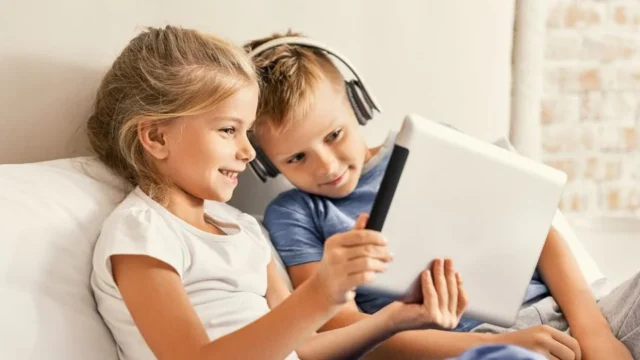
If you have ever considered getting a tablet for your child, this guide is for you. Maybe you are sitting on the fence and trying to weigh up the good points vs the bad ones. Wherever you stand, it’s certainly valid. There are plenty of pros to gifting a tablet to a child, but as with any form of technology, negative repercussions are just as relevant. To help you reach a decision, this is a list of the many pros and cons of tablet usage for kids.
What are Tablets for Children?
Some specific markets produce kid-friendly versions of adult tablets, but generally speaking, any tablet can be adapted for this purpose. This range demonstrated by Lenovo, for instance, is a great starting point to explore the many options out there.
Pros
To start off, let’s explore the advantages that tablets bring forward.
Tablets are Educational
Apps exist in the millions — around five million to be more precise, according to certain research. This figure refers to apps on Android and Apple app stores. Out of these five million apps, there is a percentage that is learning focussed. Children as young as two are the target audience in some cases and these apps are designed with a range of educational activities to choose from. Right through from pre-school to post-school, kids can benefit from study aids, reading guides, drawing tutorials, and problem solving games that aim to enhance their general learning capacity.
Some of these apps are so useful that they are even used in schools as a part of the daily lessons, and promoted for homework purposes too. The key benefits to take away are that educational apps can help a learner realise their full potential and learning style, teach core concepts on a better timescale and in a more fluid environment, and provide flexible access to comprehensive educational materials.
Dexterity Skills

Dexterity skills are often intuitively developed; however, it doesn’t hurt to encourage them along with external input. Using tablets requires finger muscles, arm and hand movement, and even calls upon the eyes and the head as well. Fine motor skills are a necessary precursor to acquiring other essential knowledge such as how to hold a pen in order to write, holding cutlery to eat, and more recreational activities such as bike riding, tying knots, and playing an instrument. The motions of swiping, pressing, typing, and zooming in or out, for example, are all examples of how tablets support dexterity building.
Time Management and Organisation Building
Alarms, reminders, and a family calendar are just three of the options you can utilise on a kids’ tablet to enable them to discover a higher autonomy when it comes to time management. Of course, it will remain the primary carer’s responsibility to oversee the child’s schedule. However, there is value in allowing freedom and nurturing self-assertion in this respect. Tablets can be used for all of the above, and even something as straightforward as setting an alarm for school and teaching a young person to get themselves up and out of bed in the morning will be invaluable when they are out in the world on their own.
Relaxation Time
It is just as important that children have recreation and downtime as it is for adults. The stress and tiredness from school work and social pressures are sometimes overlooked in young people who are expected to adapt and bounce back in such a different way than is expected of adults. While resilience building is also a useful parenting tool, nurture is also essential and the two can co-exist. A tablet is a great way of winding down owing to the millions of games and exciting activities, communication prospects, and the ability to stream TV or movies.
Communication Benefits

Tablets are a super platform for communication. They have instant messaging applications, can facilitate video calls and voice calls, and provide a flexible and fairly constant platform for conversing. This can aid parent to child relationships and promote a more natural mode of starting off more difficult conversations. This translates also into a classroom setting where teachers use tablets to monitor progress and answer student questions throughout the lesson.
Cons
So, the pros are fairly conclusive in proving that tablets certainly have benefits for children, not only educationally, but also socially. For fairness’ sake, it is now time to address the downsides of this technology.
Interrupts Sleep Patterns
Staring at a screen is not conducive to great sleep. The hormone melatonin is responsible for inducing sleepiness, and tablet screens interfere with the production of said hormone. Why? The blue light on the screen is unnatural. Because of this, people who use tablets and such before regular bedtimes usually experience more issues with actually falling asleep and staying asleep. The consequences of a bad night’s sleep are almost too many to count but the main ones to note are:
- A decreased cognitive ability which in turn affects the capacity for school work and important social occasions.
- A lack of sleep negatively affects mood regulators and leads to low mood generally and a decreased ability to manage emotions on any scale.
- Fewer chances to recover and recoup which makes the body vulnerable to infection and decreases capacity to recover when poorly.
Demotivates Inclination for Physical Activity

There is a heightened risk if screen time is managed poorly, that children will move away from wanting to be outside. Tablets are naturally attention grabbing and stimulate the brain in a different way than going out into the world. A natural consequence is then subconscious reclusiveness, and an increased desire to stay inside and plugged in. Tension can be a further consequence and conflict may ensue between child and caregiver.
So, tablets have their advantages and their downsides. All the points made above are valid considerations to call upon when deciding on whether or not this is a viable purchase. However, the negative aspects can largely be managed by parenting techniques and pre-agreed boundaries or rules around usage.












